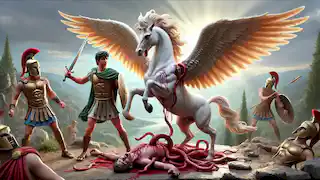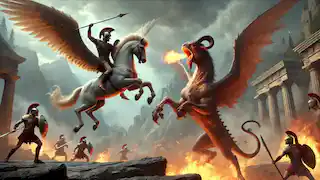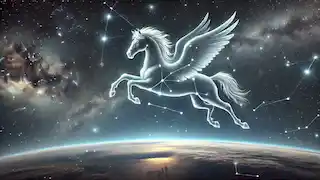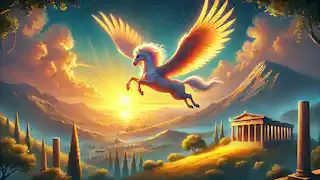Long ago, in ancient Greece, a land filled with myths and legendary heroes, there lived a creature so magnificent that its very name was whispered in awe: Pegasus. This winged horse soared through the skies, symbolizing freedom, beauty, and divine grace. Born of both gods and monsters, Pegasus carried with him the weight of the heavens and the power of the wind, his majestic wings outstretched in pursuit of adventure and destiny. This is the tale of how Pegasus came to be, how he lived, and how his legend shaped the very fabric of Greek mythology. The legend of Pegasus begins with a monstrous creature—Medusa, once a beautiful maiden cursed by the gods. Her serpentine hair and petrifying gaze struck fear in all who beheld her. Medusa was one of the three Gorgon sisters, but she alone was mortal. It was foretold that only the bravest of heroes could challenge her, and that hero was Perseus, son of Zeus. Perseus, equipped with divine gifts—a mirrored shield from Athena, a sword from Hermes, and winged sandals from the gods—set out to defeat Medusa. His mission was not merely for glory but to save his mother from the tyrannical Polydectes. Perseus reached the lair of the Gorgons, deep in a desolate land. There, among the lifeless statues of warriors who had failed before him, he faced Medusa. Using the reflection of his shield to avoid her deadly gaze, he beheaded her with a swift strike of his sword. From the blood of Medusa, as her lifeless body fell to the ground, a miracle occurred. Two beings sprang forth: Chrysaor, a giant wielding a golden sword, and the magnificent Pegasus. The winged horse emerged fully formed, his coat shimmering like the stars, his wings vast and powerful, ready to conquer the skies. Born of both mortal and divine essence, Pegasus was destined for greatness. Pegasus roamed the heavens, free and unbound by earthly chains. His beauty and power caught the attention of many, but none could tame him. The gods watched with curiosity as Pegasus soared through the skies, his every movement a display of divine elegance. However, one mortal dared to dream of taming the winged horse—Bellerophon, the prince of Corinth. Bellerophon had his own quest for glory. He was a renowned hero, but like many Greek figures, his ambition would drive him to seek the impossible. He yearned to ride Pegasus, for with such a steed, he could conquer any challenge, even the dreaded Chimera—a monstrous creature with the body of a lion, the head of a goat, and the tail of a serpent, which terrorized the kingdom of Lycia. One night, Bellerophon sought guidance from the gods. He went to the temple of Athena, goddess of wisdom and war, and prayed for a way to capture the elusive Pegasus. Athena, moved by his devotion, appeared to him in a dream. She presented him with a golden bridle and instructed him to approach Pegasus with this divine gift. Upon waking, Bellerophon found the golden bridle beside him, gleaming in the dawn's light. With the bridle in hand, Bellerophon set out to find Pegasus. After days of searching, he spotted the majestic creature drinking from the fountain of Pirene, a spring said to be formed by the tears of the nymphs. Slowly, cautiously, Bellerophon approached, whispering words of praise and respect. To his astonishment, Pegasus accepted the bridle, and at that moment, the bond between man and beast was forged. Together, Bellerophon and Pegasus soared into the skies, a partnership that would become legendary. They flew over mountains and valleys, through storms and calm skies, their connection growing stronger with each passing day. When the time came to face the Chimera, Bellerophon mounted Pegasus and they flew into battle. With Pegasus' speed and agility, Bellerophon was able to strike down the Chimera from the skies, avoiding its fiery breath and deadly claws. Their victory over the Chimera solidified their place in the annals of Greek heroism. Bellerophon, however, was not content. His pride grew with every triumph, and he began to believe that he was worthy of joining the gods on Mount Olympus. Bellerophon's victories made him a celebrated figure, but his hubris—the excessive pride that often led to the downfall of Greek heroes—began to cloud his judgment. He believed that he deserved a place among the gods themselves, and with Pegasus by his side, he decided to fly to Mount Olympus to claim his rightful place. As they ascended higher and higher into the sky, Pegasus' wings beat powerfully, but the gods were watching. Zeus, the king of the gods, was angered by Bellerophon's arrogance. No mortal, no matter how great their deeds, could ever ascend to the realm of the gods. As Bellerophon reached for the gates of Olympus, Zeus sent a gadfly to sting Pegasus. Startled, the winged horse bucked wildly, throwing Bellerophon from his back. Bellerophon plummeted from the heavens, falling to the earth below. His hubris had led to his downfall, and though he survived the fall, he was forever crippled. He spent the rest of his days wandering in misery, shunned by both mortals and gods. Pegasus, however, was spared Zeus' wrath. The gods recognized that Pegasus had been an unwilling participant in Bellerophon's folly. Zeus welcomed the winged horse to Mount Olympus, where Pegasus was given a new role. He would now carry Zeus' thunderbolts, becoming a symbol of divine strength and power. Pegasus' time on Mount Olympus was one of honor and respect. The gods admired his loyalty and grace, and he became a trusted servant of Zeus. He was often seen flying through the heavens, his powerful wings carrying him across the skies, bringing thunder and lightning to the earth. Despite his new role, Pegasus never lost his sense of freedom. He would often soar beyond the clouds, exploring the stars and constellations, a symbol of both divine and natural beauty. It was said that wherever Pegasus flew, the air was filled with a sense of wonder and awe, as if the very essence of the heavens was being carried on his wings. One day, as a final gesture of respect for the noble creature, Zeus decided to immortalize Pegasus among the stars. He placed the winged horse in the night sky, creating the constellation that we know today as Pegasus. There, among the twinkling stars, Pegasus continues to soar, his image forever etched in the heavens, a reminder of his legendary adventures and the balance between freedom and responsibility. The story of Pegasus lived on in the hearts and minds of the ancient Greeks. He became a symbol of inspiration for poets, warriors, and dreamers alike. Artists depicted Pegasus in their works, his wings outstretched in glorious flight, while poets wrote of his beauty and power. The tale of the winged horse reminded mortals of the delicate balance between ambition and humility, between the desire for greatness and the acceptance of one's limitations. In time, Pegasus' legacy spread beyond Greece, inspiring countless generations around the world. His story was told and retold, his image appearing in art, literature, and mythology across cultures. He became a symbol of hope and aspiration, a reminder that while the heavens may be out of reach for mortals, the pursuit of one's dreams can lead to extraordinary feats. To this day, the constellation of Pegasus can be seen in the night sky, a celestial tribute to the winged horse whose legend transcends time. As we gaze upon those stars, we are reminded of the enduring power of myth, of the beauty and freedom that Pegasus represents, and of the timeless nature of his story. The story of Pegasus is one of triumph, tragedy, and transcendence. It is a tale that captures the essence of Greek mythology, where gods and mortals intertwine, and where the pursuit of greatness is tempered by the lessons of humility. Pegasus, born from the blood of a monster, rose to the heavens and became a symbol of both divine grace and human aspiration. His story, forever immortalized in the stars, serves as a reminder that even in the pursuit of greatness, one must never forget the importance of humility and respect for the natural order.The Birth of Pegasus

The Adventures of Pegasus and Bellerophon

Hubris and the Fall of Bellerophon

Pegasus Among the Stars

The Legacy of Pegasus
Conclusion
The Story of the Pegasus
Reading Time: 8 min

About Story: The Story of the Pegasus is a Myth Stories from greece set in the Ancient Stories. This Dramatic Stories tale explores themes of Perseverance Stories and is suitable for All Ages Stories. It offers Cultural Stories insights. The mythic journey of Pegasus, the legendary winged horse of Greece.
















